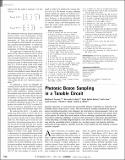| dc.contributor.author | Dove, Justin Michael | |
| dc.contributor.author | Aaronson, Scott | |
| dc.contributor.author | Broome, Matthew A. | |
| dc.contributor.author | Fedrizzi, Alessandro | |
| dc.contributor.author | Rahimi-Keshari, Saleh | |
| dc.contributor.author | Ralph, Timothy C. | |
| dc.contributor.author | White, Andrew G. | |
| dc.date.accessioned | 2014-03-21T15:40:47Z | |
| dc.date.available | 2014-03-21T15:40:47Z | |
| dc.date.issued | 2012-12 | |
| dc.date.submitted | 2012-10 | |
| dc.identifier.issn | 0036-8075 | |
| dc.identifier.issn | 1095-9203 | |
| dc.identifier.uri | http://hdl.handle.net/1721.1/85873 | |
| dc.description.abstract | Quantum computers are unnecessary for exponentially efficient computation or simulation if the Extended Church-Turing thesis is correct. The thesis would be strongly contradicted by physical devices that efficiently perform tasks believed to be intractable for classical computers. Such a task is boson sampling: sampling the output distributions of n bosons scattered by some passive, linear unitary process. We tested the central premise of boson sampling, experimentally verifying that three-photon scattering amplitudes are given by the permanents of submatrices generated from a unitary describing a six-mode integrated optical circuit. We find the protocol to be robust, working even with the unavoidable effects of photon loss, non-ideal sources, and imperfect detection. Scaling this to large numbers of photons should be a much simpler task than building a universal quantum computer. | en_US |
| dc.description.sponsorship | National Science Foundation (U.S.) (Grant 0844626) | en_US |
| dc.description.sponsorship | United States. Defense Advanced Research Projects Agency (Young Faculty Award) | en_US |
| dc.description.sponsorship | Alfred P. Sloan Foundation (Fellowship) | en_US |
| dc.language.iso | en_US | |
| dc.publisher | American Association for the Advancement of Science (AAAS) | en_US |
| dc.relation.isversionof | http://dx.doi.org/10.1126/science.1231440 | en_US |
| dc.rights | Creative Commons Attribution-Noncommercial-Share Alike | en_US |
| dc.rights.uri | http://creativecommons.org/licenses/by-nc-sa/4.0/ | en_US |
| dc.source | arXiv | en_US |
| dc.title | Photonic Boson Sampling in a Tunable Circuit | en_US |
| dc.type | Article | en_US |
| dc.identifier.citation | Broome, M. A., A. Fedrizzi, S. Rahimi-Keshari, J. Dove, S. Aaronson, T. C. Ralph, and A. G. White. “Photonic Boson Sampling in a Tunable Circuit.” Science 339, no. 6121 (February 15, 2013): 794–798. | en_US |
| dc.contributor.department | Massachusetts Institute of Technology. Computer Science and Artificial Intelligence Laboratory | en_US |
| dc.contributor.department | Massachusetts Institute of Technology. Department of Electrical Engineering and Computer Science | en_US |
| dc.contributor.mitauthor | Dove, Justin Michael | en_US |
| dc.contributor.mitauthor | Aaronson, Scott | en_US |
| dc.relation.journal | Science | en_US |
| dc.eprint.version | Author's final manuscript | en_US |
| dc.type.uri | http://purl.org/eprint/type/JournalArticle | en_US |
| eprint.status | http://purl.org/eprint/status/PeerReviewed | en_US |
| dspace.orderedauthors | Broome, M. A.; Fedrizzi, A.; Rahimi-Keshari, S.; Dove, J.; Aaronson, S.; Ralph, T. C.; White, A. G. | en_US |
| dc.identifier.orcid | https://orcid.org/0000-0002-6539-056X | |
| dc.identifier.orcid | https://orcid.org/0000-0003-1333-4045 | |
| mit.license | OPEN_ACCESS_POLICY | en_US |
| mit.metadata.status | Complete | |
